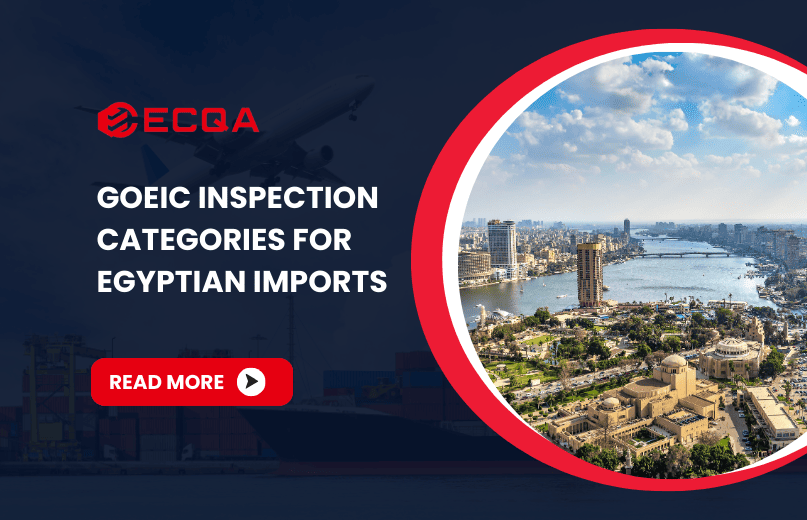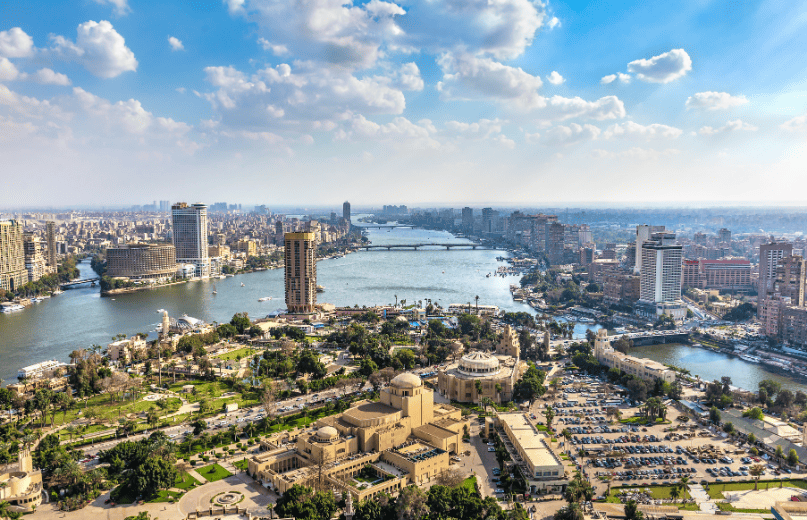
GOEIC Inspection Categories for Egyptian Imports
GOEIC, General Organization for Export and Import Control, is a governmental body under the Egyptian Ministry of Trade and Industry. It serves a critical function in regulating the quality and safety of imported and exported goods. While it might sound like just another layer of bureaucracy, GOEIC is actually the backbone of Egypt’s trade compliance system.

GOEIC is responsible not only for inspections but also for registering foreign manufacturers and exporters, certifying shipments that meet requirements, and working with customs authorities to oversee incoming cargo. Depending on the product type and its risk level, inspections may involve random sampling or mandatory checks.
Ultimately, GOEIC decides whether a shipment is cleared for entry into the Egyptian market or held at the port.
Why GOEIC Inspection Is Mandatory for Certain Product Categories
So, what makes certain products subject to GOEIC inspection while others pass through customs with relative ease? It boils down to consumer safety, economic protection, and regulatory oversight.
1. Legal Foundation
The backbone of GOEIC’s authority lies in several key ministerial decrees, particularly Decree No. 991/2015 and Decree No. 43/2016. These regulations designate a list of products that require mandatory inspection and manufacturer registration. Under these laws, any importer wishing to bring in listed goods must work with registered production facilities, and shipments are only cleared after passing GOEIC’s strict inspection process.
2. High-Risk Products Demand Higher Scrutiny
Not all goods are created equal in the eyes of regulators. Items that have direct contact with consumers, especially food, cosmetics, electronics, and children’s products—pose a higher safety risk. These are the types of products most likely to harbor defects, toxic substances, or misleading labels if left unchecked.
As a result, Egypt mandates that these “high-risk” categories undergo GOEIC inspection to ensure they meet ISO, IEC, or Egyptian standard equivalents. Even minor infractions, such as improper labeling or undocumented test results,can trigger a full-blown customs hold.
3. Protection Against Low-Quality Imports and Counterfeits
Egypt’s growing domestic industries have also led the government to crack down on low-quality or counterfeit imports. GOEIC inspections act as a safeguard, weeding out subpar goods that could undermine local manufacturing or exploit consumers through deceptive branding.
By requiring conformity certificates, test reports, and factory registrations, GOEIC ensures that imported goods meet the same standards expected from local producers. This levels the playing field and builds trust in the Egyptian market.
4. Exporters Must Register Before Shipping Certain Goods
Another key reason inspections are mandatory? Exporter registration. For many product categories, GOEIC requires that foreign factories register their production sites in advance. This isn’t just paperwork, it involves submitting technical documentation, proof of compliance, and in some cases, undergoing physical audits.
Failure to register a factory means your shipments will be automatically rejected at customs, regardless of product quality.
Key Product Categories Subject to GOEIC Inspection
Egypt’s General Organization for Export and Import Control (GOEIC) plays a central role in safeguarding the national market by inspecting and approving a wide range of imported goods. While not all products require certification, many critical product categories must undergo mandatory testing, documentation checks, and regulatory approvals before clearance. Below are the main categories most commonly subject to GOEIC scrutiny:
1. Electrical Appliances and Electronics
The electronics and household appliances sector is one of the most tightly regulated by GOEIC—and for good reason. These products directly interact with users and, if poorly designed or manufactured, can pose serious safety hazards such as electrical shock, fire, or device failure. The inspection process ensures that every imported unit meets international safety benchmarks and Egyptian energy efficiency standards before reaching consumers.
- Household appliances: refrigerators, washing machines, air conditioners
- Consumer electronics: televisions, mobile phones, laptops, desktop computers
- Electrical tools and lighting products
Why it matters: GOEIC enforces strict regulations to ensure these products comply with electrical safety, performance reliability, and energy-saving requirements, reducing the risks of short circuits, overheating, and fire hazards.
2. Building Materials and Construction Products
Given Egypt’s ongoing urban development and infrastructure expansion, construction materials are a key focus area for GOEIC. Products like cement, steel, tiles, and sanitary ware must meet engineering, durability, and safety criteria, as substandard materials could endanger entire building structures.
- Core materials: cement, steel bars, concrete mixes
- Finishing materials: ceramics, sanitary ware, marble, granite
- Plumbing components: pipes, valves, and fixtures
Why it matters: GOEIC ensures these products meet structural integrity standards and material safety protocols, preventing failures in critical construction projects that could pose public safety risks.
3. Textiles, Garments, and Footwear
Textile and garment imports undergo inspections that cover not only product quality but also labeling accuracy, chemical safety, and verification of origin. These measures are essential to prevent counterfeit products from entering the market and to safeguard consumer health, especially for items that come into direct contact with the skin
- Apparel and fashion: shirts, pants, jackets, uniforms
- Fabrics and textiles: fabric rolls, cotton blends, synthetic materials
- Footwear and leather goods: shoes, belts, handbags
Why it matters: GOEIC screens for allergenic materials, improper labeling, and unauthorized substances like azo dyes or formaldehyde, helping protect Egyptian consumers and ensure fair market practices.
4. Cosmetics and Personal Care Products
The cosmetics and personal care industry is under intense regulatory scrutiny due to the direct application of products to the skin, hair, and body. GOEIC’s inspection process focuses on ingredient verification, toxicological assessments, and product registration before clearance.
- Skin care: lotions, sunscreens, anti-aging creams
- Hair care: shampoos, conditioners, hair dye
- Cosmetics: makeup, perfumes, deodorants
Why it matters: GOEIC helps prevent exposure to banned chemicals, allergens, and microbial contaminants, ensuring only safe, tested products reach Egyptian consumers.
5. Food and Agricultural Products
Food products are among the most heavily regulated by GOEIC due to their impact on public health and food security. Inspections cover everything from pesticide residue testing to packaging compliance and expiry labeling.
- Fresh and frozen produce: fruits, vegetables, seafood
- Processed foods: canned goods, snacks, ready meals
- Grains and dairy: rice, wheat, milk, cheese, yogurt
- Beverages: juices, soft drinks, alcoholic beverages
Why it matters: GOEIC ensures food imports meet sanitation, shelf-life, and packaging standards, helping to prevent spoilage, contamination, and non-compliance with Egyptian food safety laws.
6. Automotive and Spare Parts
Whether it’s a new vehicle or a replacement part, automotive imports undergo GOEIC inspections to confirm technical compliance and road safety readiness. Faulty parts not only compromise vehicle performance but also endanger passengers and drivers alike.
- Vehicles: new and used cars, motorcycles, scooters
- Spare parts: brakes, batteries, suspension components
- Accessories: tires, lights, mirrors, oil filters
Why it matters: GOEIC validates these items against performance, durability, and safety benchmarks, keeping Egypt’s roads safer and reducing accidents due to substandard automotive components.
7. Toys and Baby Products
Children’s products require special regulatory attention due to their vulnerability to choking hazards, toxic chemicals, and design flaws. GOEIC inspections ensure that toys and baby goods are manufactured in accordance with international child safety standards.
- Toys: plastic toys, electronic toys, educational games
- Baby gear: bottles, pacifiers, cribs, strollers, high chairs
- Child furnishings: mats, walkers, baby seats
Why it matters: GOEIC tests for choking hazards, sharp edges, lead content, and ensures proper CE marking for safe usage, helping prevent injuries or long-term health risks in children.
8. Furniture and Home Furnishings
Imported furniture and home accessories are reviewed for material safety, durability, and compliance with fire retardant standards. GOEIC ensures that items like sofas, beds, and office chairs are both comfortable and safe for long-term use.
- Furniture: wooden furniture, metal frames, mattresses
- Home furnishings: curtains, cushions, rugs
- Office and public use items: desks, conference chairs, cabinets
Why it matters: GOEIC tests for formaldehyde emissions, flammability, and structural strength, reducing health hazards and extending product lifespans in Egyptian homes and businesses.
Understanding GOEIC inspection requirements can feel complex at first, but with proper preparation they are fully manageable. Egypt enforces strict import controls to ensure consumer safety, maintain product quality, and support fair competition.
ECQA helps manufacturers, exporters, and importers navigate every stage of the compliance process. Our services cover factory registration, pre-shipment inspections, labeling reviews, documentation, and audit support. Whether you are entering the Egyptian market for the first time or expanding existing trade, we provide the guidance needed to achieve compliance with confidence.

 Request Free Sample Report
Request Free Sample Report